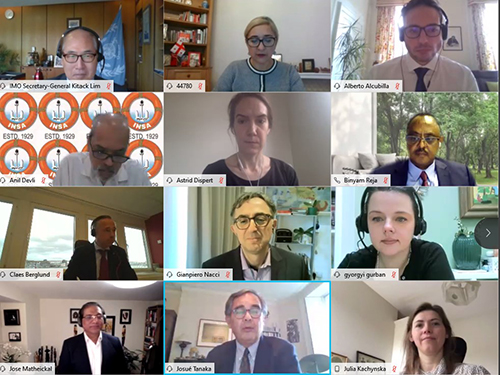More than 50 leaders from the financial, public and private sectors participated in the first “Financing Sustainable Maritime Transport (FIN-SMART) Roundtable” on 27 October, addressing the need to accelerate finance to support sustainable shipping, particularly in developing countries.
The FIN-SMART Roundtable is a platform for dialogue among maritime stakeholders on addressing the financial challenges related to the transition of shipping to a more sustainable future.
The high-level virtual Roundtable on Tuesday was hosted by the IMO, the European Bank for Reconstruction and Development (EBRD) and the World Bank Group.
The Roundtable aims to support accelerating financial flows, particularly in developing countries, for the decarbonization of the maritime sector, in line with country priorities and the goals of the IMO Initial Strategy on the reduction of GHG emissions from ships.
This comes in line with an agreement signed between IMO and the Republic of Korea this week, to establish a training programme to support developing States to reduce GHG emissions from shipping. The four-year partnership will support GHG reduction training in Least Developed Countries (LDCs) and Small Island Developing States (SIDS).

Speaking at the opening of the meeting, IMO Secretary-General Mr. Kitack Lim called for strong support to accelerate finance for sustainable maritime transport, in particular in decarbonization and sustainable recovery post COVID-19.
These will be only possible with targeted investment and strategic partnerships, particularly addressing special needs of developing countries, LDCs and SIDS,
…he said.
During the inaugural meeting, participants looked for concrete opportunities to help accelerate global financing for sustainable shipping, especially in low- and middle-income countries.
Among the options were identifying priorities and investment opportunities across the maritime supply chain, as well as addressing barriers to financial flows, and harnessing support for country reform efforts.
What brought us here today is to exchange ideas on how to support the development of the long-term decarbonization of the shipping industry and create financial products to achieve this. It is the EBRD’s ambition to support the formulation of a low-carbon pathway for the shipping industry that aligns industry stakeholders, encourages the uptake of technological solutions and develops the instruments to enable the necessary investments. These activities require close cooperation based on strong partnerships,
…Mr. Josué Tanaka, Managing Director of Operational Strategy and Planning, Energy Efficiency and Climate Change at EBRD, said.
Shipping is not only a cornerstone to international trade, but it is also key to sustainable development. By helping unlock sustainable maritime investment and finance, FIN-SMART will both promote the decarbonization of the sector and create in-country business opportunities and jobs,
…Mr. Binyam Reja, Global Transport Manager at the World Bank, said.
Participants also acknowledged the critical importance of fostering collaboration and strategic partnerships to ultimately address the sustainability challenges of the maritime sector.































































